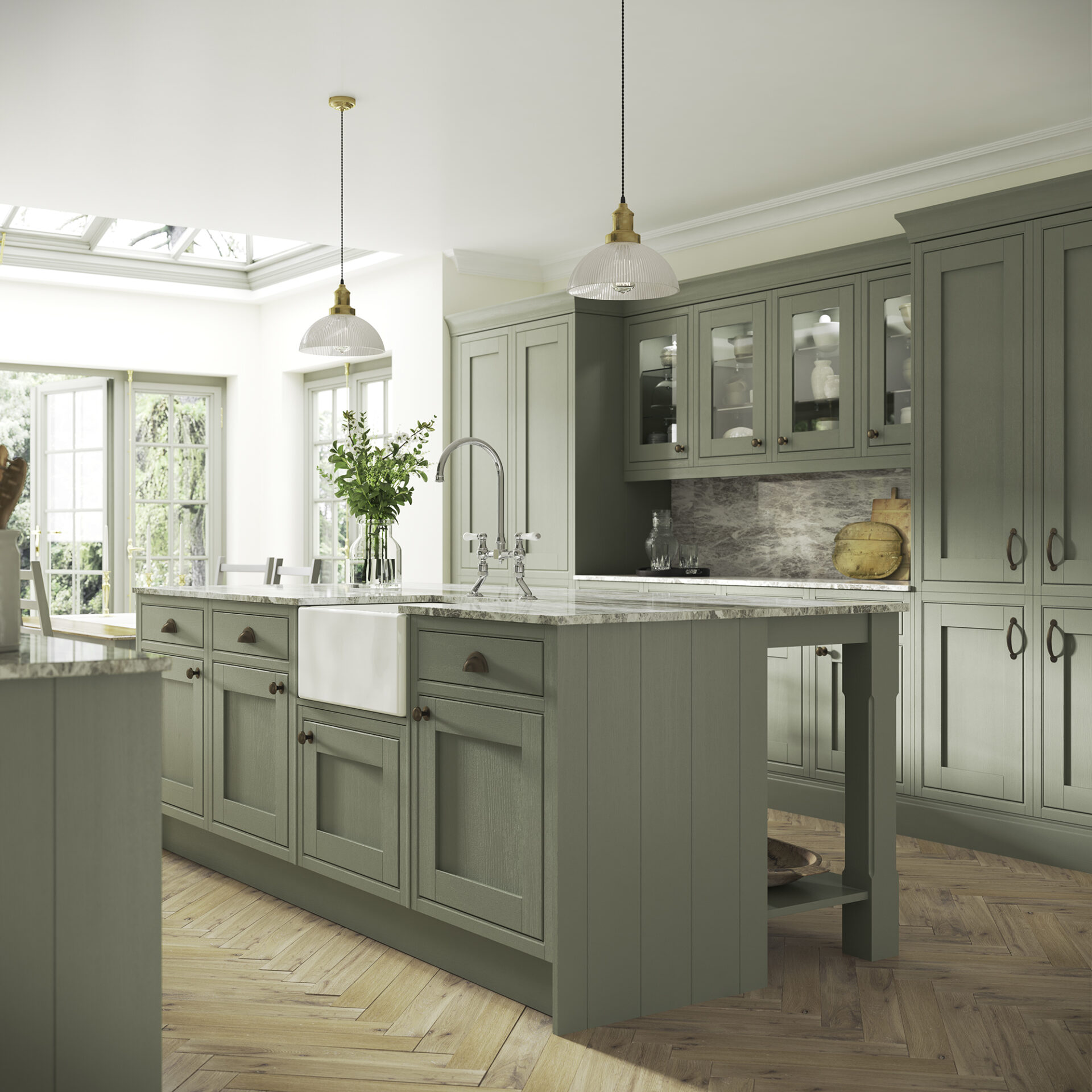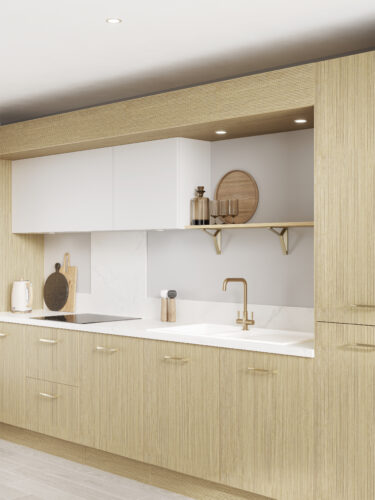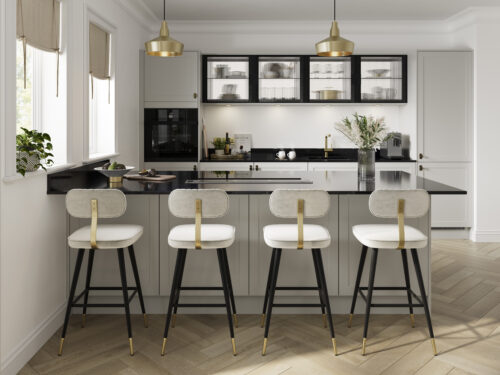
How to Care for your Symphony Kitchen
When you buy a kitchen, you want it to look as good as new for as long as possible. No matter the size, style or budget, a new kitchen is always an investment. That’s why here at Symphony, we want to help you care for your kitchen, from the worksurfaces and cabinets to the sink and appliances. It’s the one room of the home that gets constant use. From cooking family meals to sitting and snacking, socialising, entertaining, relaxing and even working, our kitchens need to cope with a multitude of tasks so cleaning them regularly and looking after their materials, finishes and colours is key to ensuring their longevity in performance as well as aesthetics.
General advice
Symphony cabinets are manufactured to comply with the British Standard BS 6222 and have been tested and passed FIRA Gold product certification, so you can be sure that you are getting a kitchen that is built to last. As a general rule, make sure the kitchen is always well ventilated when cooking, as any steam and condensation can result in damage to the doors and units. An extractor hood is a must and try to open the window a little too if it’s not too cold outside. If any spills or splashes occur when prepping food, cooking or dining (and they always do), then wipe away and dry straight away. Always wipe any water off cabinetry with a soft dry cloth, as cabinets aren’t made to be water resistant so could swell if left unwiped. Use non-abrasive cloths and check handle screws regularly to keep everything secure. Speaking of security, heavy items should always be placed on the bottom or lower shelves of cabinets and never be tempted to pop your kettle or a steamer underneath a wall unit or on worksurface joins, in order to minimise the harmful effects of condensation.

Cleaning the cabinetry
Make cleaning the cabinets part of a regular deep kitchen clean. Start by cleaning them with a slightly damp, non-abrasive cloth with a little dab of liquid soap then dry thoroughly. Never use strong chemical cleaners on doors, shelves or surfaces. Inside, try to take all the contents out on a regular basis and give the insides a good wipe down with a damp cloth before wiping dry. This is also a good time to check use-by dates and rotate items so that you’re using up food that needs eating and avoiding unnecessary food waste.
Looking after laminate
Laminate surfaces have come a long way in recent years and they are now an attractive and affordable alternative to natural stone and wood. Another benefit is that this cost-effective solution is also designed for easy maintenance and a long life, so clean up finger marks, tea and coffee spills with a quick wipe with a damp cloth. Use a chopping board for cutting ingredients and a worktop saver or trivet for hot pans. For stubborn stains, start with a damp cloth and mild detergent then switch to a mild household cleaner with a soft bristle brush. If this still doesn’t work, try baking soda or a non-scratch cleaner with a soft bristled brush. Don’t be tempted to use acidic or abrasive cleaners nor polish, especially on glossy finishes. Another tip is to never wear a PVC apron when cooking, as over time it can rub against the laminate and cause a change in the texture and colour of the surface!
Giving granite a deep clean
Granite worksurfaces bring natural stone beauty into your kitchen and look stunning for years to come with a little care and attention. If you choose granite with your Symphony kitchen, you’ll get an MN Easy-Clean solution, which removes grease, oil and general dirt from granite surfaces. Use in conjunction with MN Power-Clean for stubborn stains and refine the shine every now and then with Lithofin MN Polish Cream. A going over every month or so will add extra protection against scratches and water marks, especially on marble and limestone worktops.
Caring for quartz
You may have selected Silestone quartz for your worksurfaces and these are also low maintenance, as their low porosity prevents them from absorbing fluids. As a daily routine, wipe them every day with soap and warm water to help them retain their natural shine. Always rinse and dry after cleaning and any stubborn marks can be tackled with a cream cleaner and non-abrasive pad. Never use harsh chemicals or solvents or any product with a high alkaline/PH level. You should always ensure you have a trivet underneath any hot pans and a chopping board when using sharp knives.
Enjoying Earthstone worktops for longer
When your new Symphony kitchen includes Earthstone worktops, you’ll get a Scotchbrite pad, Countertop Magic Polish and microfibre cloth in your Care and Maintenance Kit. Once a week, wipe surfaces with warm soapy water then buff dry and apply a thin, even coat of Countertop Magic before wiping off immediately with a clean microfibre cloth. Once dry, repeat this process then buff again. If you spill anything like coffee, tea or juice, some mild discolouration can occur so clean with a mild detergent and water. If it’s not budging, try a mix of domestic bleach and warm water, wearing rubber gloves to protect your hands. Anything more stubborn will need a non-abrasive cream cleaner and nylon brush, rubbed gently over the stain. And for really difficult stains, try rubbing a Scotchbrite pad dipped in warm soapy water in a circular motion. Whichever method you are using, always rinse with warm water afterwards before buffing dry and applying two coats of Countertop Magic Polish across the entire worksurface.
Sinks need careful cleaning too
As well as cabinets and worksurfaces, the kitchen sink should also be cleaned daily. Use a mild cream detergent to prevent stains and be careful when placing heavy or sharp objects into the sink. Something we don’t tend to think of is leaving open containers of cleaning products under the sink. Try to make sure they are closed and well contained at all times, as this avoids condensation forming under the sink. Everyday tea stains can be treated with a cream cleaner on a soft cloth. The same goes for general grease and limescale. Brown spots and light scratches on stainless steel sinks can be removed with a stainless steel cleaner such as Bar Keeper’s Friend and, as with every element of your kitchen, after cleaning always dry the area thoroughly.

Appliance Care
When it comes to your appliances, every manufacturer should supply general cleaning advice within their manuals, so make sure you read these before cleaning.
If you’ve just moved into a new home, you’ll find a Welcome to your new home brochure from us in your new kitchen. You can also find more hints and tips here.

